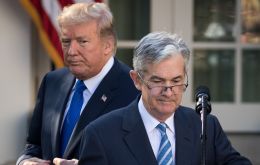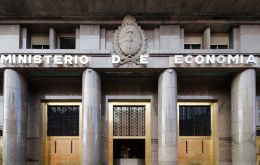MercoPress. South Atlantic News Agency
Stories for October 24th 2018
-
Wednesday, October 24th 2018 - 08:40 UTC
Argentine Peso slips on Tuesday; central bank sells debt notes at a rate of 71.39%

Argentina’s peso slipped on Tuesday, a day after the central bank’s new governor reassured the public that its approach to taming the country’s rocky economy would be sustainable over the medium term. The peso closed 0.46% weaker at 36.65 per U.S. dollar. The currency has fallen 0.30% against the dollar this week, although it has climbed 12.63% since the beginning of the month.
-
Wednesday, October 24th 2018 - 08:39 UTC
Risk of return to violence if a hard Brexit is imposed, says Irish president Higgins

Irish President Michael D Higgins has said he shares the concerns of the country’s premier Leo Varadkar that there is a risk of a return to violence if a hard border is imposed post-Brexit. Mr Higgins said: “I do share the Taoiseach’s concern.”
-
Wednesday, October 24th 2018 - 08:35 UTC
Maximo Kirchner appeared in court but refused to answer questions

Argentine national deputy Máximo Kirchner and eldest son of former presidents Néstor Kirchner and Cristina Fernández de Kirchner, appeared in court on Tuesday morning to testify in the so-called ‘notebooks’ corruption case, probing the alleged payments of millions of dollars in bribes and kickbacks siphoned off from public works projects.
-
Wednesday, October 24th 2018 - 08:34 UTC
Trump again bashes the Fed, saying it posed the biggest risk to the US economy

United States president Donald Trump has sharpened his attacks on the Federal Reserve, saying it posed the biggest risk to the US economy. He also targeted Fed chairman Jerome Powell, telling the Wall Street Journal he seemed “happy” to be raising interest rates.
-
Wednesday, October 24th 2018 - 08:28 UTC
UK government watchdog warns Britain is not ready for a no-deal Brexit

Britain will “pay the price” of a no-deal Brexit because complicated new border controls may not be ready in time, a UK government watchdog has warned. Thousands of UK exporters did not have enough time to prepare for new border rules, the National Audit Office said.
-
Wednesday, October 24th 2018 - 07:15 UTC
Argentina reports trade surplus in September, the first since December 2016

Argentina had a trade surplus of US$ 314 million in September, official statistics agency Indec said on Tuesday, the first since December 2016 and an early sign the devaluation of the peso currency has benefited the country’s exporters.
